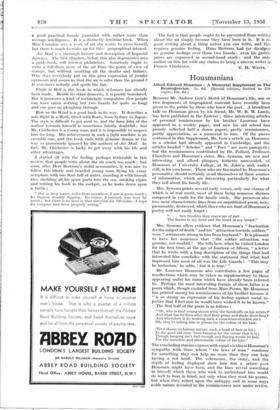Housmaniana
BESIDES Mr. Andrew Gow's Sketch of. Housman's life, one of two fragments of biographical material have recently been given to the public by those who knew the poet. "'A broudeaSt
talk on Housman given by his friend, Mr. W. R. M. Lamb, has been published in the Listener ; three interesting articles of personal reminiscence by his brother Laurence have appeared in a weekly paper, and now his old school has piously collected half a dozen papers, partly reminiscence, partly appreciation, as a memorial to him. Of the pieces contained in this Supplement, Mr. Gow's article on Housman as a scholar had already appeared in Cambridge, and the articles headed " Scholar " and " Poet " are mere panegyric ; but the reminiscences contributed by Dr. Pollard, Professor Chambers and Housman's sister, Mrs. Symons, are new and interesting, and afford glimpses, hitherto unrevealed, of Housman at University College, at St. John's, and, earlier still, in his own home. Those who are fascinated by Housman's personality should certainly avail themselves of these sources of information, which are interesting particularly for what they tell about his family life.
Mrs. Symons prints several early verses, only one stanza of which is of real merit, most of them being nonsense rhymes composed in youth for the family circle. She preserves also
two most characteristic lines from an unpublished poem, now, presumably, destroyed, which those who are fond of Housman's poetry will not easily forget :
". . . two troubles they reeve me of rest
The brains in my head and the heart in my breast."
Mrs. Symons offers evidence that Housman's " fascination for the subject of death " and his " attraction towards soldiers " were " sentiments strong in him from boyhood." It is pleasant to have her assurance that " the soldier attraction_ was genuine, not morbid." She tells how, when he visited London for the first time, at the age of fourteen or fifteen, " a letter
that he wrote with a long description of the things -that had
interested him concludes with the statement that what had impressed him most of all was the Life Guards ! ` This may
be barbarian;' he adds, ' but it is true.' " _ . .
Mr. Laurence Housman also contributes a few pages ot recollections which may be taken as supplementary.tathose. appealing under his name which have already been referred
to. Perhaps the most interesting feature of these latter is 41: poem which, though excluded from More Poems, Mr. Housman has printed among his reminiscences of his brother because it is so strong an expression of his feeling against social in- justice that I feel sure he would have wished it to be known." The first half of the poem isas follows :
" Oh, who is that young sinner with the handcuffs on his wrists ?* And what has he been after that they groan and shake their fists ? And wherefore is he wearing such a conscience-stricken air ? Oh, they're taking him to prison for the colour of his hair.
'Tis a shame to human nature, such a head of hair as his ; In the good old time 'twas hanging for the colour that it is ; Though hanging isn't bad enough and flaying would be fair, For the nameless and abominable colour of his hair."
The concluding stanzas express with equal vividness Housman's' sympathy with those whom " the laws of man " condemn
for something they can help no more than they can help. having a red head. The vehemence, the irony, and the depth of feeling displayed show how fine a satiric poet Hdusrnan might have been, and the lines reveal something in himself which those who wish to understand him would do.siell to bear in mind, not only when they, read his poems, but when they reflect upon the unhappy and in some ways noble nature revealed' in -the reminiscences now 'unilei review.














































 Previous page
Previous page